Eerdmans Anglican Faith, Life, and Church Collection (12 vols.)
Digital Logos Edition
Overview
This collection offers insight into Anglican theology and church life in contemporary society, gathering 13 volumes by a diverse body of scholars, writers, and theologians.
Examine the first in-depth study of the foreign missions of the Church of England. Discover three of Robert Farrar Capon’s early works. Peruse articles from distinguished church historians, literary historians, and ecumenists written in honor of the Reverend Canon J. Robert Wright. Explore the Protestant background and history of Anglican Christianity. Learn how to use prayer beads and the basic prayer structure they provide to pray through each day.
Coupling engaging topics and unique perspectives, the Eerdmans Anglican Faith, Life, and Church Collection helps readers flesh out their understanding of Anglican history and spirituality, and examine challenges the church faces in the modern age.
Want an even better deal? Get more books at a bigger discount when you order the Eerdmans Bible Reference Bundle 2!

- Examines Anglican church history
- Offers perspective on the growth and development of the church today
- Includes two volumes by popular author Robert Farrar Capon
- Title: Eerdmans Anglican Faith, Life, and Church Collection
- Publisher: Eerdmans
- Volumes: 12
- Pages: 3654
- Christian Group: Anglican
- Resource Type: Topical; Histories; Monographs
- Topic: Anglicanism; Theology
Individual Titles
- Mighty England Do Good: Culture, Faith, Empire, and World in the Foreign Missions of the Church of England, 1850–1915 by Steven S. Maughan
- The Fate of Communion: The Agony of Anglicanism and the Future of a Global Church by Ephraim Radner and Philip Turner
- The Collects of Thomas Cranmer by Paul F. M. Zahl and C. Frederick Barbee
- Glorious Companions: Five Centuries of Anglican Spirituality by Richard H. Schmidt
- One Lord, One Faith, One Baptism: Studies in Christian Ecclesiality and Ecumenism in Honor of J. Robert Wright by Marsha L. Dutton and Patrick T. Gray
- The Protestant Face of Anglicanism by Paul F.M. Zahl
- God’s People in God’s Land: Family, Land and Property in the Old Testament by Christopher Wright
- A Burning and a Shining Light edited by David Lyle Jeffrey
- Reclaiming Faith: Essays on Orthodoxy in the Episcopal Church and the Baltimore Declaration edited by Ephraim Radner and George R. Sumner
- Praying with Beads: Daily Prayers for the Christian Year by Robert Farrar Capon
- The Mystery of Christ . . . and Why We Don’t Get It by Robert Farrar Capon
- The Romance of the Word by Nan Lewis Doerr and Virginia Stem Owens
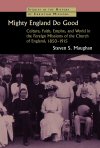
In late Victorian and Edwardian England, says Steven Maughan, foreign missions had a broad resonance and significance not adequately explored by historians of English culture. Mighty England Do Good fills that lacuna by examining the rapid growth of foreign missions in the Church of England between 1850 and 1915, culminating at the height of the missionary enterprise in Britain. Maughan’s book bridges the gaps between religious, cultural, and imperial history to give a full picture of the movement’s importance.
Maughan explores Anglicanism as a microcosm of the larger religious culture of Britain, particularly in light of the expanding British Empire. This book provides a multidimensional reassessment of the power that foreign missions had to shape belief, institutions, culture, and practice not only within the Church of England but also in the broader culture of the time.
The last two decades have seen an explosion of interest in Britain’s Christian missions. Steven Maughan’s monumental study will be of particular significance in understanding the complexities of British overseas expansion, the changing nature of metropolitan religious society, and the ideology of evangelicalism everywhere. The range of Maughan’s research will make this an indispensable starting point for years to come.
—Andrew Porter, emeritus professor, department of history, King’s College London
Steven Maughan’s Mighty England Do Good provides the best introduction to one of the most important voluntary institutions of modern England—the Anglican missionary enterprise. Guiding readers through the complexities of the High Church and Evangelical church parties, he explores competing visions of the relationship between Christianity, English national identity, and empire.
—Jeffrey Cox, professor, history department, University of Iowa
A much-needed study. . . . Maughan argues convincingly that as Britain became modern, increasingly tied to and shaped by its international links, the foreign missions of its national church mattered immensely to its developing national identity, at home as well as abroad. In particular, Maughan’s meticulously researched and elegantly written work does what most mission histories do not: it offers a nuanced analysis of the contribution of women and gender in missions.
—Rhonda Semple, associate professor, St. Francis Xavier University
Steven S. Maughan is professor of history at The College of Idaho.
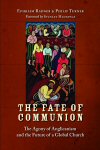
Current debates over a host of issues, particularly those relating to homosexuality, have left the 70-million-member Anglican Communion straining to understand what it means to be a communion—and even wondering whether life as a communion is possible.
In this timely book two priest-scholars, Ephraim Radner and Philip Turner, examine the future of the concept of “communion” as a viable church structure, tracing its historical development as a self-conscious Anglican third way between Protestant congregationalism and Catholic centralism. In examining this essential issue, Radner and Turner relate the specific challenges of the US Episcopal Church to the unity of the worldwide communion, touching on such divisive subjects as the place of Scripture, liberal theology, and episcopal authority. Their discussion is at once measured and impassioned, erudite and practical.
Compelling reading for Episcopalians and those in other traditions who are searching for a truly Christian approach to these thorny topics, The Fate of Communion is a forthright, direct examination of a church in turmoil.
Even if you have no interest in the Episcopal Church of America or Anglicanism; even if you have no interest in Christianity; even if you have no interest in the disputes surrounding homosexuality in our culture at large; you should benefit from this book. . . . Radner and Turner have written an extremely intelligent love letter to the church.
—Stanley Hauerwas, Gilbert T. Rowe Professor of Theological Ethics, Duke University
This book is both powerful and illuminating, both passionate and scholarly. No better study exists of the pros and cons regarding whether the worldwide Anglican Communion will hold together in the present crisis. Unlike many collaborative works, The Fate of Communion is lucid and readable. As a non-Anglican, I can testify to its importance for all those concerned about the future of communion not only in a global church, as the subtitle carefully states, but also in the church universal.
—George Lindbeck, Pitkin Professor Emeritus of Historical Theology, Yale Divinity School
A timely, sober, and intelligent account of Anglicanism’s travails, equally matched by a bold call to holiness of life in communion and in conciliar forbearance in Christ. In the end this is a hopeful book about God's vocation for Anglican Christianity, that is, for a communion which finds its calling in obedience, mutual submission, and missionary service. In its trenchant analysis of American culture, The Fate of Communion is much more than a book for Anglicans alone.
—Christopher Seitz, professor of biblical interpretation, Wycliffe College
[This reader] is grateful for the clarity of the analysis and the theological rigor whereby the authors seek to establish the historic principle of the authority of Holy Scripture in the church’s life as a communion.
—International Bulletin of Missionary Research
At first I thought [The Fate of Communion] wasn’t a book for me . . . But then I was hooked and had trouble putting it down. Because here are two deeply serious, conservative Episcopalians who are looking at the turmoil in the church with a loving concern and an intelligent and faithful hope for the future.
—Good News
Radner and Turner offer a challenging vision, perhaps an impossible one. But it is the best on offer for the Anglican Communion, and The Fate of Communion contains much to ponder.
—First Things
Ephraim Radner is an Episcopal priest and rector of Church of the Ascension, Pueblo, Colorado. He is the author of several books, including Hope among the Fragments and The End of the Church.
Philip Turner is the former dean of the Berkeley Divinity School at Yale. He is now vice president of the Anglican Communion Institute.
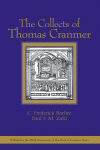
Thomas Cranmer’s Prayer Book of 1549 is a foundational document of the Anglican Church and a priceless part of English-speaking Christianity. Cranmer’s unique gift of blending theological substance with simple, humble, and moving clarity has made the Collects (prayers) essential not only to the English liturgy but also to the pastoral tradition of the church: these prayers still remain a deep source of inspiration for Christians enmeshed in the everyday trials and testings of life.
Published on the occasion of the 450th anniversary of the Book of Common Prayer, The Collects of Thomas Cranmer presents this spiritually rich material in its original form and order. Compiled and presented for devotional use by C. Frederick Barbee and Paul F.M. Zahl, Cranmer’s Collects are each followed by succinct commentary on their historical context and an insightful meditation crafted with contemporary Christians in mind.
Including a significant introduction to Cranmer and his work by C. FitzSimons Allison, this beautifully produced volume opens afresh Cranmer’s classic devotional treasure to modern believers from all communions.
For those who are interested in the way that the sixteenth-century Reformation interacts with contemporary theological concerns, there is much to ponder in this slim volume.
—Diarmaid MacCulloch, Sixteenth Century Journal
This lovingly prepared edition of the Anglican Collects, or short prayers, which first appeared in this form in the Book of Common Prayer of 1549, should pique the interest of both religion scholars and devout communicants. . . . Recommended for most collections, especially those strong in Christian spirituality.
—Library Journal
Thomas Cranmer was a master of the English language, and the Prayer Book is an essential element of the rich legacy of faith, devotion, and liturgy that belong to our heritage. . . This edition of the Collects will bring the prayers to life in a new way for many. In particular, I am struck by the meditations based on each of the Collects. . . I thank Barbee and Zahl for this gift and commend the book warmly.
—George Carey, former archbishop of Canterbury
Paul F.M. Zahl is a retired Episcopal priest. He formerly was rector of All Saints Episcopal Church in Chevy Chase, Maryland, and dean and president of Trinity Episcopal School for Ministry, Ambridge, Pennsylvania.
C. Frederick Barbee (1949–2004) was Canon of the Cathedral Church of the Advent in Birmingham, Alabama, and editor of the Anglican Digest.
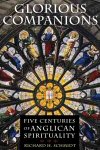
This wonderful compendium of religious biographies offers a look inside the hearts and minds of significant shapers of Anglican spirituality over the past five centuries—Thomas Cranmer, John Donne, George Herbert, John Wesley, Dorothy Sayers, C.S. Lewis, Madeleine L’Engle, and many more.
Covering 29 of the most influential Anglican figures from the sixteenth century to the present, Richard H. Schmidt deftly chronicles their lives and work while capturing at the same time the deep personal faith that they have managed to communicate so powerfully to the rest of the world.
These icons of the Christian faith include not only bishops and scholars but also housewives, poets, novelists, and teachers. Each chapter contains a brief biographical sketch of its subject, a selection of short, representative quotations from his or her writings, and several questions for reflection and discussion.
Written in a personable style that brings readers into direct contact with some of the church’s most admired witnesses, Glorious Companions will be valued both as a collection of insightful biographical information and as a lasting source of inspiration.
This is quite a delightful book for its personal insights (Dorothy Sayers drove a motorbike and chain-smoked), and useful for its broad selection of men and women. The biographies are short in themselves, but the addition of thoughts, book extracts and prayers from the ‘glorious companions’ makes this a useful book.
—Church of England Newspaper
A very substantial but simply written view of notables in and of the Anglican-Episcopal spiritual communion since the days of Thomas Crammer . . . including John Donne, the Wesleys, Evelyn Underhill, and Madeleine L’Engle. . . . This volume should interest Anglicans and non-Anglicans alike.
—Library Journal
Richard H. Schmidt is editor and director of Forward Movement Publications. He has also served as an Episcopal parish priest in West Virginia, Missouri, and Alabama. He has also been managing editor of the magazine, the Episcopalian.
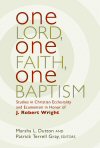
One Lord, One Faith, One Baptism gathers 21 articles from distinguished church historians, literary historians, and ecumenists—written in honor of the Reverend Canon J. Robert Wright, St. Mark’s Professor of Ecclesiastical History at the General Theological Seminary of the Episcopal Church, who has been an inspiration to a generation of students and colleagues. Presiding Bishop of the Episcopal Church, Frank T. Griswold has written a foreword that complements the work of contributors such as S.W. Sykes, Richard A. Norris Jr., and George Tavard, among others. Though these articles differ in individual subject, they cohere in their relation to Dr. Wright’s expertise as a theologian, a historian, a medievalist, an ecumenist, and above all a man of the church.
Contributors
- Victor Lee Austin
- Walter R. Bouman
- Joseph Britton
- Marsha L. Dutton
- E. Rozanne Elder
- C. Christopher Epting
- John V. Fleming
- R. William Franklin
- Patrick Terrell Gray
- Petra Heldt
- Joanne McWilliam
- Robert Bruce Mullin
- Jon Nilson
- Richard A. Norris Jr.
- Robert W. Prichard
- Michael Root
- William G. Rusch
- S.W. Sykes
- Mary Tanner
- George Tavard
- Ellen K. Wondra
Marsha L. Dutton is Samuel and Susan Crowl Professor of Literature at Ohio University.
Patrick T. Gray is curate at Church of the Advent, Boston and a ThD candidate at the General Theological Seminary, New York
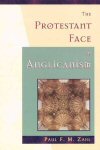
This volume tells a story that is virtually unknown today: the Protestant background and history of Anglican Christianity. Through a fascinating exploration of the development of Anglicanism and its wider Protestant context, Paul Zahl attempts to show—contrary to the opinion of many present-day “Anglican writers”—that Anglicanism is not just a via media (between Rome and Geneva, for example) but has been stamped decisively by classic Protestant insights and concerns. He also discusses the implications of Anglicanism’s Protestant history for our own age, suggesting that this dimension has an important contribution to make to the worldwide Christian community in the new millennium.
Paul F.M. Zahl is a retired Episcopal priest. He formerly was rector of All Saints Episcopal Church in Chevy Chase, Maryland, and dean and president of Trinity Episcopal School for Ministry, Ambridge, Pennsylvania.
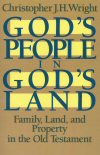
In recent sociological approaches to the Old Testament, Christians have been finding unexpected resources for their ethical reflection and action relative to the modern world’s pressing social and economic dilemmas.
This unique survey by Christopher Wright examines life in Old Testament Israel from an ethical perspective by considering how the economic facts of Israel’s social structure were related to the people’s religious beliefs. Observing the centrality of the family in social, economic and religious spheres of Israelite life, Wright analyzes Israel’s theology of land, the rights and responsibilities of property owners, and the socioeconomic and legal status of dependent persons in ancient Israel—wives, children, and slaves—showing the mutual interaction between such laws, institutions, and customs and the nation’s covenant relationship with God.
While primarily exegetical, God’s People in God’s Land contains many useful insights for Christian social ethics: Wright suggests how the ethical application of his findings might proceed as Christians with different theological perspectives and cultural contexts seek to work out the relevance of the Old Testament for today.
Christopher J.H. Wright is director of studies and lecturer in Old Testament and ethics at All Nations Christian College, Ware, England. His other books include An Eye for an Eye, What Does the Lord Require?, and User’s Guide to the Bible.
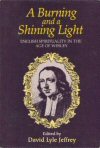
An anthology of some of the best English spiritual writings in the age of the great evangelical revival. Includes writings from Isaac Watts, Philip Doddridge, Lizbeth Rowe, William Law, Christopher Smart, John and Charles Wesley, George Whitefield, John Fletcher, John Newton, Hannah More, William Wilberforce, and more. This volume gathers sermons, devotions, hymns, and poetry.
David Lyle Jeffrey is distinguished professor of literature and the humanities at the Institute for Studies of Religion at Baylor University.
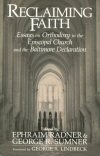
Reclaiming Faith: Essays on Orthodoxy in the Episcopal Church and the Baltimore Declaration
- Editors: Ephraim Radner and George R. Sumner
- Publisher: Eerdmans
- Publication Date: 1993
- Pages: 298
These essays, contributed by a scholarly group of “postliberal” theologians, commend the usefulness of traditional Christian language and doctrine for articulating the gospel today, and are pertinent to many mainline Protestant denominations and to the Roman Catholic Church—indeed to all churches struggling with current revisionary challenges to traditional doctrine.
Ephraim Radner is an Episcopal priest and rector of Church of the Ascension, Pueblo, Colorado. He is the author of several books, including Hope among the Fragments and The End of the Church.
George R. Sumner is principal of Wycliffe Collge in Toronto, Ontario.
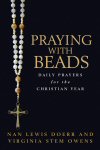
Prayer is essential to the Christian life, bonding us to God. Yet we find it difficult in our frenetic world to keep our minds focused for long. All kinds of external noise and inner voices clamor for our attention. How can we slow down and quiet down so as to truly wait on the Lord? Nan Lewis Doerr and Virginia Stem Owens offer a solution that calls on the physical senses to break through to the spiritual—praying with beads. The use of prayer beads, which has a long history in practical spirituality, is now becoming more widespread among Protestants. Doerr and Owens here show readers how to use what have become known as Anglican or Christian prayer beads. Readers can then use the basic prayer structure provided by the beads to pray their way through each day—morning, noon, and night—and through the church year. These prayers can be enhanced and enriched by the mindful and meditative practice of using beads.
Doerr and Owens encourage readers to use beads as “something to hang onto, a lifeline to the presence that lies, often hidden or forgotten, at the center of our lives.” Praying with beads, as outlined and embodied in this little book, has the potential to transform one’s prayer life.
Nan Lewis Doerr is rector of Church of the Redeemer (Episcopal) in Houston, Texas. She has led numerous workshops and retreats on the use of prayer beads and other spiritual disciplines.
Virginia Stem Owens is a writer whose many books include Living Next Door to the Death House. Formerly director of the Milton Center at Newman University in Wichita, Kansas, she is now a member of the editorial board of Books & Culture.
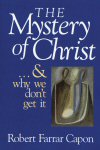
Widely recognized as a creative, insightful writer, Robert Farrar Capon offers still more of his uniquely provocative fare in The Mystery of Christ. . . and Why We Don’t Get It. This engaging book probes the meaning of salvation—peace, forgiveness, grace, reconciliation—spoken of in the New Testament as a “mystery.”
Reminding his readers—sometimes in startling ways—that salvation is a gift rather than a transaction, Capon uses a variety of exchanges to drive home his point that salvation can be achieved not just through faith, but by active works. Along the way, he explores guilt, forgiveness, love, anger, romance, grief, spiritual contentment, the Incarnation, reincarnation, resurrection, and more—managing, in the process, to make salvation something fresh and new.
Robert Capon . . . has composed a wonderful book that is so full of God’s grace that the reader, even those who affirm solo gratis, will be compelled to comment, ‘Hey, we do get it now!’ In a simple and enjoyable manner, Capon clarifies the mystery of Christ, namely, that God’s grace is free and sufficient to encompass every situation.
—The Clergy Journal
Robert Farrar Capon (1925–2013) was an Episcopal priest and the author of many popular books, including The Supper of the Lamb.
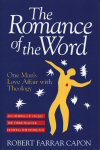
This wonderful trilogy again makes available three of Robert Farrar Capon’s sought-after early works: An Offering of Uncles, The Third Peacock, and Hunting the Divine Fox. Brought together under one cover to stand as a kind of “theological trinity,” the books in this volume each offer a refreshingly different take on key theological issues. A substantial new preface by Capon introduces the books and reveals how each fits into his own literary and spiritual landscape.
Capon will help many readers past some of the roughest bumps on the road to examining ‘the problem of evil’ and ‘the goodness of God’—thus making life a bit more endurable.
—New York Times Book Review (on The Third Peacock)
Many religious writers have turned again to emphasizing the love of God over dogma and morality, and while the message has been welcome it has often been delivered flatly or simplistically. Father Capon excels in that he has his pack of theological hounds come at their quarry from all sides, with many kinds of images, mind-bending, rib-tickling. Theology, he says, is a word game, the most serious word game of all, and he plays it very well indeed.
—The Christian Century (on Hunting the Divine Fox)
Robert Farrar Capon (1925–2013) was an Episcopal priest and the author of many popular books, including The Supper of the Lamb.
This title is included in the following collections
You can save when you purchase this product as part of a collection.
2025 Anglican Portfolio
$4,749.99$3,562.49Bible Reference Bundle 2.0
$4,512.95$3,599.99Logos 8 Collector's Edition Le...
$11,399.99$11,399.992025 Ultimate Library
$23,999.99$17,999.99
- $21,749.99
- $37,403.33$27,999.99